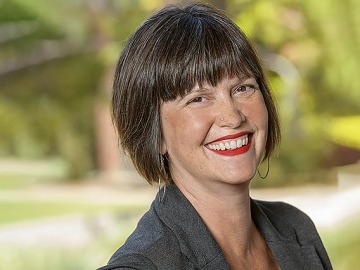Open Classroom Week offers a crash course in teaching online


Sarah Grace, teaching and learning resource specialist with the Office of Academic Affairs
As University faculty members transition to online instruction, a new effort will give faculty, staff and administrators the opportunity to learn from those already teaching in that space.
The University's first Open Classroom Week is March 23-27. The original plan was to have 32 faculty members open their classrooms for observations, including five online courses and one conducted through the Zoom video communications platform. While the in-person observations will not be taking place, the online options will be offered as planned, and several Zoom classes have been added.
Sarah Grace, teaching and learning resource specialist with the Office of Academic Affairs, says her background as a former high school teacher leads her to believe this will be an "amazing resource" for faculty.
"I've taught for a really long time," Grace said. "The best way that I know of to become better is quite simply to see other people do it."
She says Open Classroom Week is an opportunity for faculty members from all disciplines and teaching experience levels to showcase their techniques and see how others work.
"We often teach in isolation," Grace said. "This is a chance for faculty, staff and administrators to see what other people are doing."
Those signed up to observe online classes will be able to access Desire2Learn sites, allowing them to see how the instructor organizes content, discussion boards and more. The Zoom course is taught in real time, so observers can log in along with the students and watch the instructor conduct the class. They will later receive a link to a recording of the class for later viewing.
Because the in-person observations have been postponed, Grace says she has increased capacity for the online classes, which were close to full. (More information is available on the Open Classroom Week website.)
After a week of observations, Grace will hold an online debriefing on March 30 with all participants to discuss what observers and those who were observed got out of the experience.
Although the first Open Classroom Week does not look like what Grace originally had planned, she says the model is sound and demand is strong, and she hopes to repeat and even expand the program.
"I would like to do it each semester, since some faculty members only teach either in the fall or the spring," Grace said. "This would give people a chance to expect and plan for it. It would also allow faculty to showcase their talents throughout the year."
Any faculty member interested in opening up their classroom for observation during a future Open Classroom Week can email Grace for more information.
The online courses available for observation are:
Psychological Measurement and Statistics (PSY 230)
Instructor: Ashley Jordan, assistant professor of practice, Department of Psychology
In this class, students learn to calculate and interpret statistical information relevant to psychological research. Students are expected to think critically about research findings and apply information learned to write article reviews.
Introductory Biotechnology (PLS 170C2)
Instructor: Samantha Orchard, associate professor of practice, School of Plant Sciences
Students will learn about many examples of biotechnological advances and will be given the background to understand them so that they can make informed decisions. Subjects covered include approaches to making a better beer, feeding a growing population, developing biofuels and remediating global warming.
Learning in Informational Settings (EDP 314)
Instructor: Ron Marx, dean emeritus of the College of Education and professor in the Department of Educational Psychology
This course focuses on what makes non-school learning environments powerful. Students will examine how learning arrangements are differentially organized in schools and non-school settings.
Psychological Measurement in Education (EDP 358)
Instructor: Elizabeth Pope, assistant professor of practice, College of Education
In this course, students will examine psychometric methods as applied to assessment including the ethical implications of testing, test design, traditional and performance-based tests, diagnostics, automation in testing, standardized testing, and grading processes.
Personality (PSYV 352-101)
Instructor: Tierra Stimson, assistant professor of practice, College of Applied Science and Technology
This course focuses on basic concepts and issues in personality theory and research, and approaches to personality description and assessment.
The Zoom-based classes available for observation are:
Elements of Chemical and Environmental Engineering II (ChEE 202)
Instructors: Paul Blowers, Distinguished Professor, Department of Chemical and Environmental Engineering; Adrianna Brush, lecturer, Department of Chemical and Environmental Engineering
Date: Monday, March 23, noon-1 p.m.
Students will learn the fundamental principles of chemical process analysis. The course will also demonstrate how mathematics and spreadsheets can be fundamental tools for solving complex engineering problems.
Chemical Engineering Heat Transfer and Fluid Flow (ChEE 203)
Instructor: Paul Blowers, Distinguished Professor, Department of Chemical and Environmental Engineering
Date: Tuesday, March 24, 11 a.m.-12:15 p.m.
This class provides an introduction to fluid mechanics and heat transfer applied to chemical engineering.
Chemical and Physical Equilibrium (ChEE 326)
Instructors: Paul Blowers, Distinguished Professor, Department of Chemical and Environmental Engineering; Songtao Xie, lecturer, Department of Chemical and Environmental Engineering
Date: Wednesday, March 25, 11-11:50 a.m.
This course focuses on applications of thermodynamics to equilibrium processes and chemical and physical equilibrium in multicomponent systems.
Industrial-Organizational Psychology (PSYV 375)
Instructor: Brandy Perkl, assistant professor, College of Applied Science and Technology
Date: Wednesday, March 25, 6-7 p.m.
Students will learn to apply the principles of psychology to industrial and social organizations, including personnel, human factors, and organizational and consumer psychology.
Object-Oriented Programming and Design (CSCV 335)
Instructor: Odile Wolf, assistant professor of practice, College of Applied Science and Technology
Date: Thursday, March 26, 4:20-5:20 p.m.
This course provides fundamentals of object-oriented software development. This includes design principles, inheritance, polymorphism, Unified Modeling Language, testing, event-driven programming with graphical user interfaces, applications of design patterns and use of existing frameworks.

